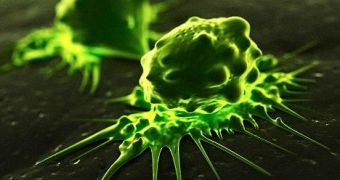Cancer has been a blight on humanity for too long, and yet it is still a persistent and widespread medical condition with no real “cure,” but this may change if a certain new treatment method gets enough backing.
Some scientists from South Korea have conducted tests with a new cancer therapy involving iron-oxide nanoparticles and magnets.
Having succeeded in attaching the nanoparticles to antibodies, the researchers gave themselves the arguably perfect tool for destroying the tumor cells without affecting the rest of the body.
The reason? Antibodies attach to the cell receptors of cancer cells, particularly the so-called death-receptor.
By subjecting the cancer cells to strong enough magnetic fields, the scientists caused the nanoparticles to come together which, in turn, triggered the process known as apoptosis (cell death), whereby the cell breaks down and the bits are devoured by chemicals.
Coincidentally, apoptosis is what chemotherapy and irradiation therapy induce as well, as this cell death is what cancer cells fail to reach, leading to tumors as they divide further and further. Alas, the main disadvantage is that the current treatments target the whole body.
Essentially, those treatments poison the patients themselves. The hope is that the cancer will die before they do.
In comparison, the magnet-based technique has been shown to kill cancer cells without damaging healthy ones. Though only lab samples have been used in tests, one case saw 50% of a colon cancer being eradicated, with no adverse effects on the healthy cells surrounding it.
Tests on living laboratory fish (zebrafish) proved promising too, although they did lead to the abnormal growth of fins for some reason.
Then again, the zebrafish has incredibly refined regenerative capabilities (can regrow fins, skin, heart and, in larval stages, even the brain). Since humans lack regeneration (unfortunately), the side effect probably can't arise. Nevertheless, more tests need to be run, which will take years, so we won't see cancer becoming a non-issue any time soon.

 14 DAY TRIAL //
14 DAY TRIAL //